英语语言学讲义 Lecture 5-semantics
- 格式:pps
- 大小:807.50 KB
- 文档页数:39
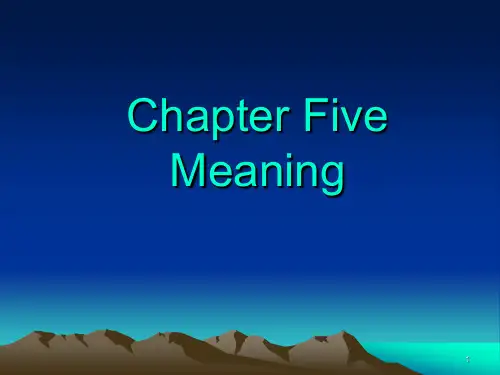
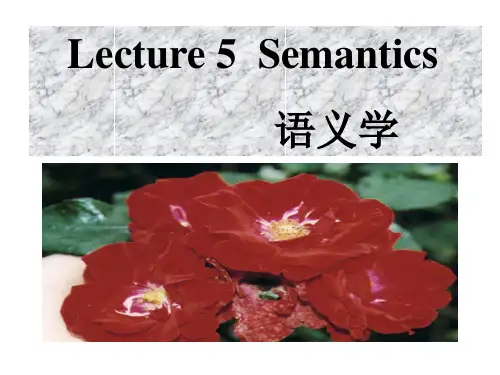
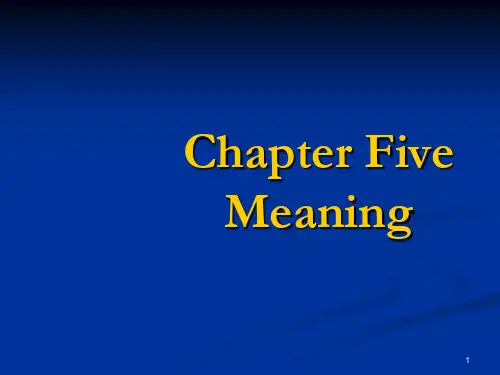
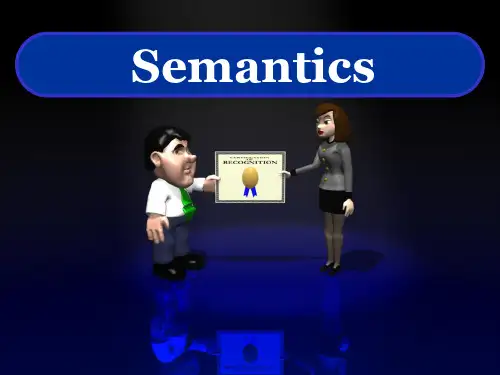
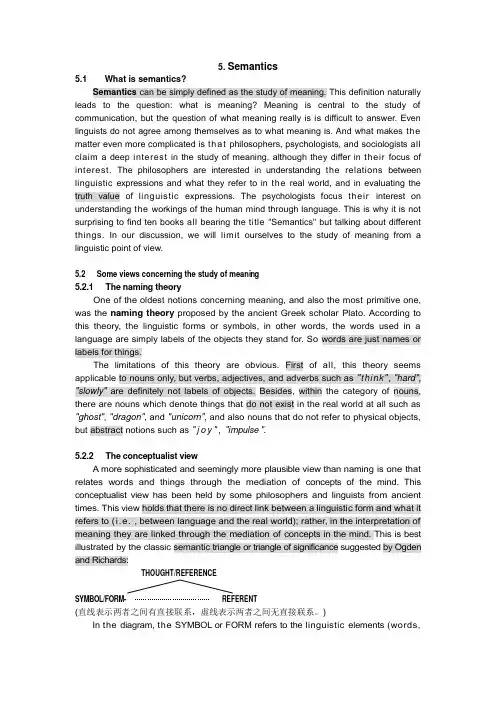
5. Semantics5.1 What is semantics?Semantics can be simply defined as the study of meaning. This definition naturally leads to the question: what is meaning? Meaning is central to the study of communication, but the question of what meaning really is is difficult to answer. Even linguists do not agree among themselves as to what meaning is. And what makes the matter even more complicated is th at philosophers, psychologists, and sociologists all claim a deep interest in the study of meaning, although they differ in their focus of interest. The philosophers are interested in understanding the relations between linguistic expressions and what they refer to in the real world, and in evaluating the truth value of linguistic expressions. The psychologists focus their interest on understanding the workings of the human mind through language. This is why it is not surprising to find ten books all bearing the title "Semantics" but talking about different things. In our discussion, we will limit ourselves to the study of meaning from a linguistic point of view.5.2 Some views concerning the study of meaning5.2.1 The naming theoryOne of the oldest notions concerning meaning, and also the most primitive one, was the naming theory proposed by the ancient Greek scholar Plato. According to this theory, the linguistic forms or symbols, in other words, the words used in a language are simply labels of the objects they stand for. So words are just names or labels for things.The limitations of this theory are obvious. First of all, this theory seems applicable to nouns only, but verbs, adjectives, and adverbs such as "think", "hard", "slowly" are definitely not labels of objects. Besides, within the category of nouns, there are nouns which denote things that do not exist in the real world at all such as "ghost", "dragon", and "unicorn", and also nouns that do not refer to physical objects, but abstract notions such as "j o y", "im pulse ".5.2.2 The conceptualist viewA more sophisticated and seemingly more plausible view than naming is one that relates words and things through the mediation of concepts of the mind. This conceptualist view has been held by some philosophers and linguists from ancient times. This view holds that there is no direct link between a linguistic form and what it refers to (i.e. , between language and the real world); rather, in the interpretation of meaning they are linked through the mediation of concepts in the mind. This is best illustrated by the classic semantic triangle or triangle of significance suggested by Ogden and Richards:THOUGHT/REFERENCESYMBOL/FORM-REFERENT(直线表示两者之间有直接联系,虚线表示两者之间无直接联系。
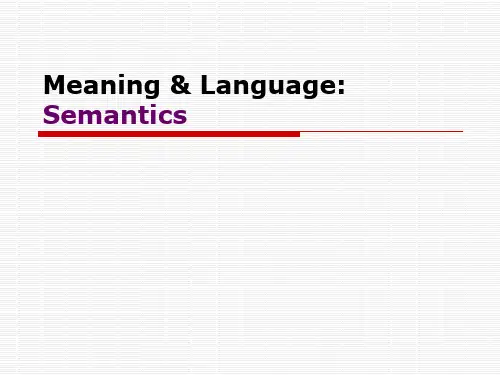
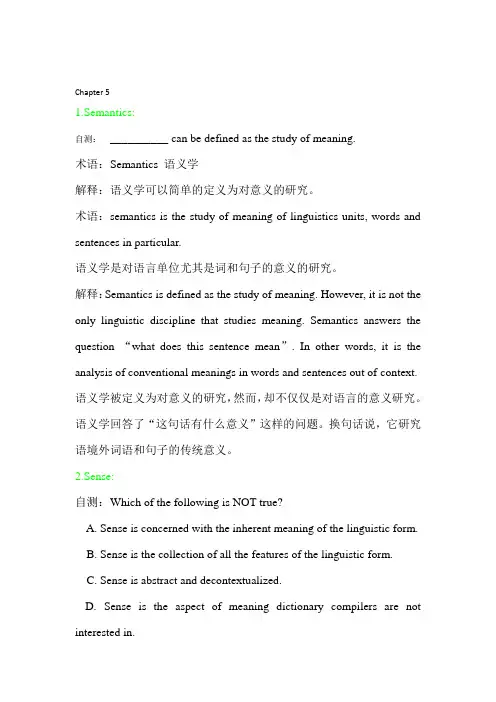
Chapter 51.Semantics:自测: __________ can be defined as the study of meaning.术语:Semantics 语义学解释:语义学可以简单的定义为对意义的研究。
术语:semantics is the study of meaning of linguistics units, words and sentences in particular.语义学是对语言单位尤其是词和句子的意义的研究。
解释:Semantics is defined as the study of meaning. However, it is not the only linguistic discipline that studies meaning. Semantics answers the question “what does this sentence mean”. In other words, it is the analysis of conventional meanings in words and sentences out of context. 语义学被定义为对意义的研究,然而,却不仅仅是对语言的意义研究。
语义学回答了“这句话有什么意义”这样的问题。
换句话说,它研究语境外词语和句子的传统意义。
2.Sense:自测:Which of the following is NOT true?A. Sense is concerned with the inherent meaning of the linguistic form.B. Sense is the collection of all the features of the linguistic form.C. Sense is abstract and decontextualized.D. Sense is the aspect of meaning dictionary compilers are not interested in.术语:Sense 涵义解释:涵义指一个实体的抽象属性。

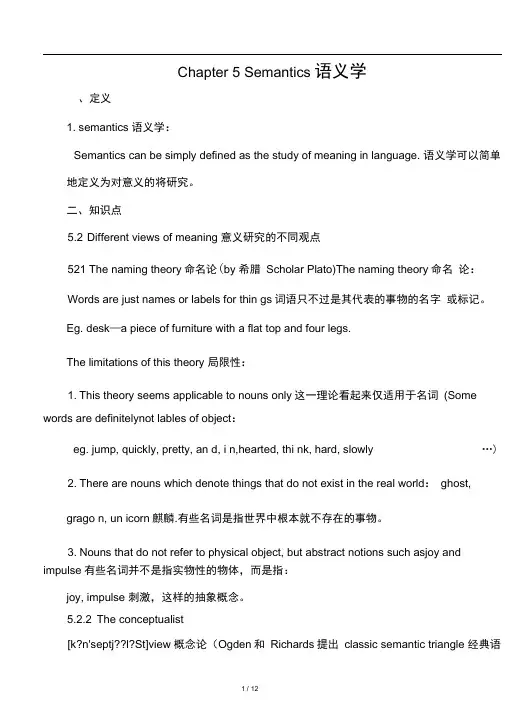
Chapter 5 Semantics 语义学、定义1. semantics 语义学:Semantics can be simply defined as the study of meaning in language. 语义学可以简单地定义为对意义的将研究。
二、知识点5.2 Different views of meaning 意义研究的不同观点521 The naming theory命名论(by 希腊Scholar Plato)The naming theory命名论:Words are just names or labels for thin gs词语只不过是其代表的事物的名字或标记。
Eg. desk—a piece of furniture with a flat top and four legs.The limitations of this theory 局限性:1. This theory seems applicable to nouns only这一理论看起来仅适用于名词(Some words are definitelynot lables of object:eg. jump, quickly, pretty, an d, i n,hearted, thi nk, hard, slowly …)2. There are nouns which denote things that do not exist in the real world: ghost,grago n, un icorn麒麟.有些名词是指世界中根本就不存在的事物。
3. Nouns that do not refer to physical object, but abstract notions such asjoy and impulse有些名词并不是指实物性的物体,而是指:joy, impulse 刺激,这样的抽象概念。
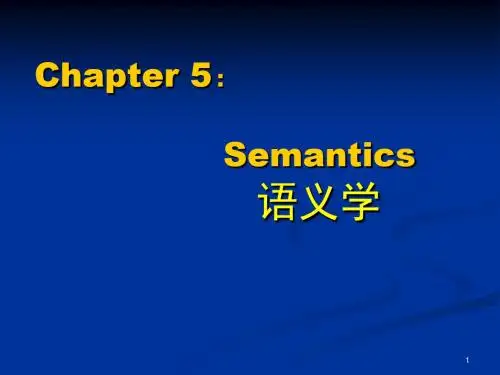

MeaningWhat is Semantics ? •Semantics -the study ofmeaning oflinguisticunits.•words•sentences•Plato •Lao Zi5.1 The meaning of meaning • C. K. Ogden & I. A. Richards (1923). The Meaning of Meaning.•presented "a representative list of the main definitons which reputable students of meaning have favoured"•16 major categories•22 all together with sub-categories•Geoffrey Leech (1974, 1981). Semantics: The Study of Meaning. Seven types of meaning:1.Conceptual meaning2.Connotative meaning3.Social meaning4.Affective meaning5.Reflected and meaning6.Collocative meaning7.Thematic meaning Associative Meaning5.1.1 Conceptual meaning•Also called ‘denotative’ or‘cognitive’ meaning.•Refers to logical, cognitive or denotative content.•Concerned with the relationship between a word and the thing it denotes, or refers to.5.1.2 Connotative meaning • Philosophical Ideasconnotations "human"-"biped,featherless, rational,etc."- the properties of the entity a word denotes •denotations •John & Maryconnotations • Linguistic Ideas politician vs. statesman -additional, esp. emotive meaning. • Philosophical Ideas "human"- "biped,featherless, rational,etc."- the properties of the entity a word denotes5.1.3 Social meaning•What a piece of language conveys about the social circumstances of its use. •Dialect: the language of a geographical region or of a social class.•Time: the language of the 18th c., etc. •Province: language of law, of science, of advertising, etc.5.1.3 Social meaning•Status: polite, colloquial, slang, etc. •Modality: language of memoranda, lectures, jokes, etc.•Singularity: the style of Dickens, etc.•domicile: very formal, official •residence: formal •abode: poetic •home: general •steed: poetic •horse: general •nag: slang •gee-gee: baby language5.1.4 Affective meaning•Reflecting the personal feelings of the speaker, including his attitude to the listener, or his attitude to something he is talking about.5.1.4 Affective meaning •You’re a vicious tyrant and a villainous reprobate, and I hate you for it!•你这个凶残的土霸王,无耻的色鬼。
我恨透你了!•I’m terribly sorry to interrupt, but I wonder if you would be so kind as to lower your voices a little.or•Will you belt up?5.1.5 Reflected meaning•Arises in cases of multiple conceptual meaning, when one sense of a word forms part of our response to another sense.•When you hear ‘click the mouse twice’, you think of Jerry being hit twice by Tom so you feel excited.•Many taboo terms are result of this.5.1.6 Collocative meaning•The associations a word acquires on account of the meanings of words which tend to occur in its environment. •pretty: girl, boy, woman, flower, garden, colour, village, etc.•handsome: boy, man, car, vessel, overcoat, airliner, typewriter, etc.5.1.7 Thematic meaning•What is communicated by the way in which a speaker or writer organizes the message, in terms of ordering, focus, and emphasis.•Mrs Bessie Smith donated the first prize.•The first prize was donated by Mrs Bessie Smith.•They stopped at the end of the corridor. •At the end of the corridor, they stopped.5.2. Referential theory•Words → Meaning: Words ‘name’ or‘refer to’ things-- Platonic•Words→Concepts→Things: Ogden & Richardsthought/concept/imagesymbolizes refers to symbol -------------------------------------- referent (word) stands for (object)5.2.1 Sense•‘Meaning’ is not some kind of‘entity’ separate from language. •That words ‘have meaning’ means only that they are used in a certain way in a sentence. There is no ‘meaning’beyond the meaning of individual words and sentences.5.2.2Sense vs. Reference •Sense: the way people relate words to each other within the framework of their language•Reference: how language refers to this external worldThe family tree•舅父 = ‘mother’s brother’•叔叔 = ‘father’s younger brother’•伯父 = ‘father’s elder brother’•姨母 = ‘mother’s sister’•姑母 = ‘father’s sister’5.3 Sense Relations•Sense-•Semantic relations between one word and another- between one linguistic unit and another.•Intralinguistic relationsdesk chair table furniture5.3.1 Synonymy•buy/purchase •thrifty/economical/st ingy•autumn/fall•flat/apartment •tube/underground •Sameness relations •Synonyms5.3.2 Antonymy•good ----------------------- bad •long ----------------------- short •big ----------------------- small •Can be modified by adverbs of degree like very.•Can have comparative forms. •Can be asked with how.a. Gradable antonymyb. Complementary antonymy•alive : dead •male : female •present : absent •innocent : guilty •odd : even •pass : fail •boy : girl •hit : missc. Converse antonymy•buy : sell •lend : borrow •give : receive •parent : child •husband : wife •teacher : student •above : below •before : after•host : guest •employer : employee5.3.3 Hyponymy•Inclusiveness•A is included in / a kind of B.•Cf.: chair and furniture, rose and flowerCo-hyponyms & superordinate • flower•• tulip violet roseAnimalbird fish insect animalhuman animaltiger lion elephant ...Hyponymy & Antonymy Beautiful plain looking uglySense Relations •Synonymy•Antonymy •Hyponymy Gradable Complementary Converse5.4 Componential Analysis•HUMAN•man (ADULT, MALE)•woman (ADULT, FEMALE) •boy (NON-ADULT, MALE)•girl (NON-ADULT, FEMALE)MALE FEMALE NON-ADULT bull cow calfram ewe lamb boar sow piglet•father: PARENT (x, y) & MALE (x) •x is a parent of y, and x is male. •take: CAUSE (x, (HAVE (x, y))) •x causes x to have y.•give: CAUSE (x, (~HAVE (x, y))) •x causes x not to have y.•Die =become (x, (~alive (x))•Kill = cause (x, (become (y (~alive (y))))) •Murder =intend (x, (cause x, (become (y, (~alive (y))))))Problems withcomponential analysis1.Many words are polysemous.e.g.: man2. Some semantic components are seen as binarytaxonomies.e.g.: male vs. female absolute oppositeyoung vs. adult relative opposite boy vs. man ≠ woman vs. girl3. There are words without neatly organized parts. *human, adult, maleMeta-language: a language used for its own sake /talking about another language.•The cat is chasing the mouse.•The mouse is chasing the cat.•I have read that book.•That book I have read.•The daughter of Queen Elizabeth’s son is the son of Queen Elizabeth’s daughter.•SM= WM+SSThank You !。